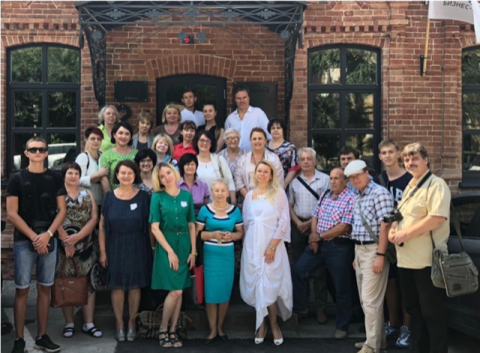2019 EECCA Regional Workshop in Russia

From 19 – 20 August, the IPEN Eastern Europe, Caucasus and Central Asia region (EECCA) Regional Workshop was completed in Volgograd, Russia. The workshop was conducted by Eco-Accord - the IPEN EECCA hub, and by "Volgograd-Ecopress" Information Centre.
The workshop participants discussed activities of IPEN member-organizations and civic organizations of Volgograd, Volzhsky, Rostov, Saratov, and Krasnodar, that deal with addressing complex issues of safe waste management, access to environmental information, and public participation in decision-making on matters of environmental significance. IPEN activities at the international level were presented, as well as specific projects of the network's member-organizations in different countries and their participation in IPEN global campaigns.
The meeting participants reviewed new trends in activities of EECCA NGOs and, general and specific problems faced by regional NGOs. In particular, they paid attention to the importance of joint activities of civic organizations to address problems of safe waste utilisation, including plastic waste and waste of 1st and 2nd hazard classes.
A particular attention was paid to participation of NGOs in implementation of four chemical conventions, namely: Stockholm, Basel, Rotterdam and Minamata conventions. The group discussed problems of implementation of the conventions in EECCA countries. Representatives of NGOs shared the results of projects dealing with monitoring of mercury contents in the human body and in fish; the relevance of monitoring sources of mercury pollution and impacts of mercury on human health was emphasised.
The workshop participants also discussed impacts of toxic chemicals on women's health and the reasons why this problem is becoming increasingly relevant. A presentation on "Gender expert assessment of projects in the sphere of chemical safety" was of great interest - the presentation was made by a representative of "Independent Ecological Expertise" NGO from Kyrgyzstan. For the first time, the question on importance of conducting such an expert assessment was raised, and advice was provided on how to conduct it by civic organizations.
On the second day of the workshop, an excursion was conducted to the Environmental Control Centre, operating in Volgograd. The Centre helps to exercise public control over the environmental situation in Volgograd and other cities of Russia. It provides environmental consultations, and carries out expert works. Almost daily, residents of Volgograd apply to the Centre with complaints about air pollution as a result of operations of "Lukoil" and "Kaustik" petrochemical plants. Due to the data obtained in the laboratory of the Centre, the city residents can substantiate their complaints and apply to the city authorities and administrations of the companies with requirements to take urgent measures for prevention of their toxic emissions.
Based on results of discussions at the workshop, the participants decided to draft a platform for the development of a safe environment, representing NGOs recommendations on key chemical safety issues. According to the workshop participants, the due chemical legislation of EECCA countries requires a fundamental reform to protect people and - as the first priority - the most vulnerable population groups, namely, children, women, the elderly, the disabled, and workers. As a priority, steps should be taken to phase out the most hazardous chemicals, to develop safe alternatives, to protect high-risk communities, and to ensure that those responsible for development, production and use of hazardous chemicals bear full financial responsibility for the damage caused to human health and the environment.
In addition, the workshop participants decided to develop an NGO Statement on the need to take urgent measures to cease production, import and use of glyphosate. In particular, the NGOs recommend:
- To develop a phased plan for complete phase out of glyphosate in EECCA countries, both at the household level and for agriculture.
- To prohibit imports and sales of glyphosate and its preparations in countries of the region;
- To monitor similar imported chemicals; to ban production of glyphosate at the territory of EECCA countries, as the most dangerous poisonous chemical that is capable to cause incompatible with life changes in the human body;
- To conduct further research studies on harmful impacts of glyphosate - in particular, on its impacts on the human endocrine system;
- To apply other measures for weeds control, based on less toxic preparations, as well as agroecology and traditional knowledge, including mowing, ploughing and crop rotation;
- To implement information campaigns and actions seeking to reduce application of glyphosate and glyphosate-containing preparations in the region.
All presentations made at the workshop are posted on the Eco-Accord website at:
http://www.ecoaccord.org/pop/index.htm
